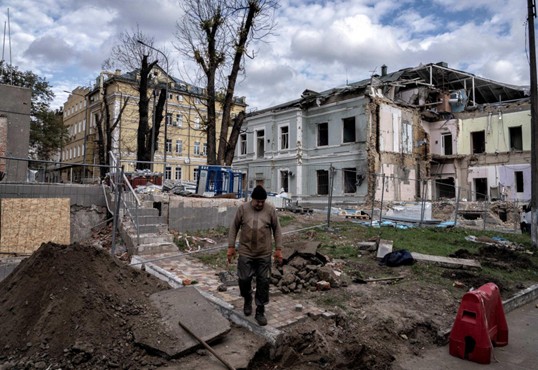As London prepares to host the world’s largest arms fair next week, health professionals must do more to counterbalance the arms industry’s influence on government agendas and its damaging effects on human and planetary health, say experts in The BMJ.
In a series of articles published in the BMJ today, Mark Bellis at Liverpool John Moores University and Gene Feder at the University of Bristol, with international colleagues, lay out the direct and wider harms of arms and show how weapons manufacturers use commercial strategies to subvert public health agendas and shape discourse around security and violence.
They argue that, like the tobacco, alcohol, and fossil fuel industries, the arms industry should be seen as a commercial determinant of health, where corporate practices matter as much as products when considering how industries can harm health.
These practices include marketing, lobbying, funding of think tanks and universities, and forging close relationships with governments, which the industry uses to shape public policy and regulatory environments in its favour while deflecting responsibility for its contribution to perpetuating conflict, injuries, and death.
The arms industry deserves more scrutiny at a time when defence spending is threatening health, say BMJ editors Jocalyn Clark and Kamran Abbasi in an editorial to introduce the series. Recent military spending commitments by the UK and other nations are reallocating resources from health and foreign aid budgets, reviving debates about warfare versus welfare not seen since the Cold War. Global military expenditure is already over $2.7 trillion annually.
While Europe must reduce its reliance on the US for security, this cannot come at the expense of welfare or by sacrificing the health and humanitarian benefits from foreign aid, they say. They urge renewed support from health professionals for a peace dividend — to maintain health and welfare spending for populations and societies both domestically and globally.
Within these spending debates there has been little if any attention paid to the arms industry as a commercial determinant of health, leaving a large gap in the scientific literature and a void where more health research and action are needed.
Bellis and colleagues’ analyses suggest that examining these industry dynamics can help uncover both direct and systemic health harms and inform how health considerations should feature alongside defence and profit.
They acknowledge that this is a conceptual shift but say “it is also a call to action for health professionals including researchers, policy makers, and civil society to advocate for a reorientation away from design, distribution, and deployment for profit and towards global priorities of health, human rights, and peace.”

Kiev (Kyiv), Ukraine: The Okhmatdyt children's hospital, renowned for its cancer treatment, which was bombed by Russian forces in July 2024. Image credit: Pierpaolo Mittica/Panos Pictures
In another editorial, Mohammed Abba-Aji at Washington University and Nason Maani at the University of Edinburgh outline research priorities and the role of health practitioners to help confront the growing power asymmetries between the arms industry and public health interests.
They say the health community has unique advantages that can be a counterpoint to industry narratives and framing of security problems and their causes. Health professionals have successfully challenged powerful industries before, through building coalitions that together expose the manipulation of policy environments, they say.
Medical journals also have a history of exposing the misdeeds of health-harming industries including the arms trade, add Clark and Abbasi, describing how protest by journal editors, doctors, and anti-arms trade campaigners led to publisher Reed-Elsevier (now RELX) divesting from the defence sector in 2007. But they say the practices and behaviour of the arms industry are not closely enough examined – nor challenged.
As such, they argue that we must go further in our scrutiny of the arms industry by recognising it as a commercial determinant of health and that the global peace dividend campaign deserves renewed support from medical journals and all health professionals.
Gene Feder, a GP and Professor of Primary Care at the Centre for Academic Primary Care, University of Bristol and Director of the Violence, Health and Society (VISION) consortium, said: "While the arms industry doesn’t directly affect how we treat patients, it has a serious impact on health—especially in conflict zones and through reduced investment in healthcare and social support. As trusted voices in society, doctors and health professionals have a role to play in highlighting and addressing these harms. Clinical academics, in particular, should work with universities to examine the health and environmental consequences of funding linked to the arms industry."
Papers:
Bellis MA et al. Weapons, wealth and health: the arms industry as a commercial determinant of health
Bellis MA et al. Weapons of influence: tactics of a growing arms industry and needed health actions
Clark J, Abbasi K. Peace dividends in the age of armament
Abba-Aji M, Maani N. Countering the arms industry as a commercial determinant of health
